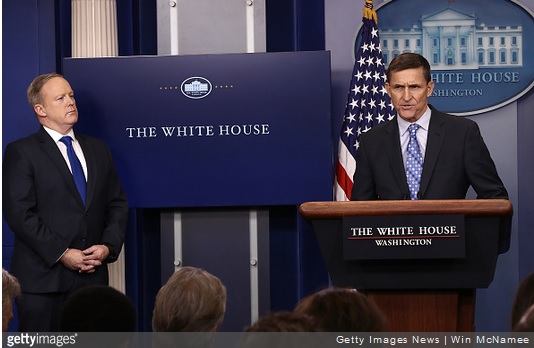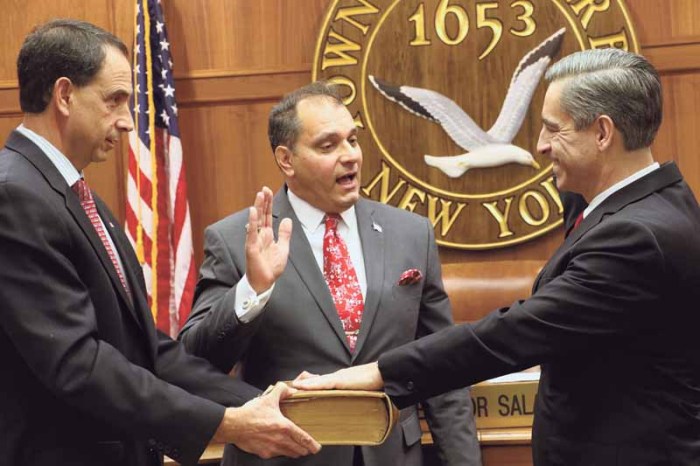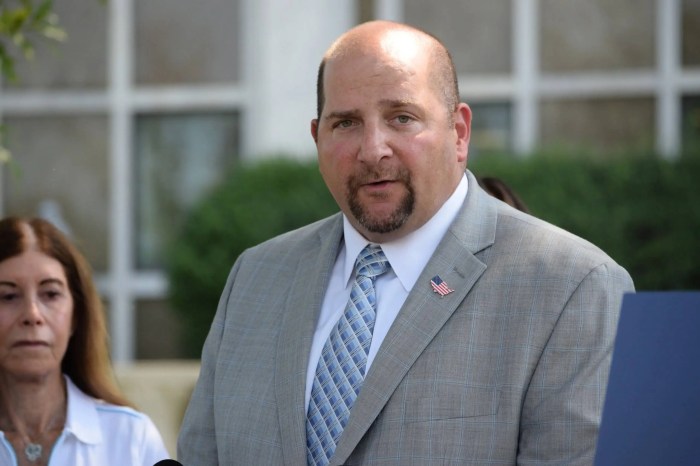The surprising resignation Monday night of President Trump’s top National Security Advisor, Gen. Michael Flynn, provoked outcries from Long Island’s Congressional delegation as his sudden departure raised more questions than answers.
Rep. Pete King (R-Seaford), who serves on the House Intelligence Committee, told the Press Tuesday afternoon, that he was worried that the resignation could be a serious distraction for the new Trump administration, less than a month old.
“We’ve got to get back on track as quickly as possible,” said Rep. King. “This is a dangerous world out there.”
King had worked with Flynn when he was head of the Defense Intelligence Agency. Flynn “did a great job,” the Congressman said, adding that he was “way ahead of the Obama administration in pointing out how dangerous ISIS was.”
Although Long Island’s senior congressman said he still had “great respect for what Gen. Flynn achieved,” he conceded that if Flynn had undermined the current Trump administration by withholding details about his secret phone conversations with Sergey Kislyak, Russia’s ambassador, on Dec. 29, they had to let him go.
“Obviously if he did not tell the truth, the full truth, to Vice President Pence, they had no choice,” King said. “You have to have total trust between the national security advisor and the president and the vice president.”
When news started to trickle out of Washington about the phone call—later it was revealed that a classified transcript of their conversation has been shared among high government officials—Flynn denied discussing any policy matters when he spoke with Vice President Mike Pence. It turns out he did. Flynn conceded on Monday that he misrepresented his supposedly secret conversations with the Russian ambassador.
But Congressman King raised another important issue.
“First of all, you’re never supposed to discuss publicly what foreign governments we’re recording,” said King, saying that he can neither confirm nor deny that it takes place. “For that to be leaked is wrong…but it’s out there.”
Flynn reportedly had discussed with Kislyak about lifting sanctions against Russia, which had been imposed in December by President Obama after our intelligence agencies concurred that Putin’s government had tried to interfere with the 2016 American election to help Trump win.
“General Flynn’s resignation is not the end of the story, it is merely a beginning,” said Sen. Charles Schumer (D-NY). “It is not the last chapter of this saga, but only the first. His resignation raises more questions than it answers and the American people deserve to know the truth.”
Among the issues raised by Flynn’s actions, Schumer said: “Was General Flynn directed or authorized to do what he did? What was the extent of his conversations and contact with Russia? Who else from the Trump administration, transition or campaign, had contact with the Russians? And why wasn’t General Flynn fired? As soon as the administration found out, why did they act only when they were caught misleading the media?”
Schumer, New York’s senior senator and Senate minority leader, has asked that newly appointed Attorney General Jeff Sessions recuse himself from leading any Justice Department inquiry into the matter because Sessions and Flynn were both early Trump supporters on his presidential campaign. Indeed, Flynn, who advised Trump on national security issues, was seen at one pro-Trump rally leading “lock her up” chants against the former Secretary of State Hillary Clinton.
In 2015, Flynn was shown on TV seated beside President Vladimir Putin at a Moscow anniversary for Russia Today, the Kremlin-controlled television network. Flynn was a paid guest. In his new role for the Trump administration, he’d given his son, Michael G. Flynn, his chief of staff, a security clearance. That became an issue when the son tweeted his belief of the “PizzaGate rumors,” the fake news started by alt-right media that Hillary Clinton was using Comet Ping Pong pizzeria in D.C. as a place for human trafficking and sex crimes. Flynn didn’t tell Vice President Pence what he’d done for his son, who’d gone on TV without knowing the truth.
Flynn’s resignation marks the third guy to fall from the Trump campaign—both before and after the November election. The first was Paul Manafort, Trump’s then-campaign manager, whose ties to Russian President Vladimir Putin and multi-million-dollar business dealings in Ukraine proved too hot on the campaign trail. Back on Aug. 17, Trump told the press that Manafort was there to stay—but two days later he was gone, ultimately replaced by Kellyanne Conway. Next to go was Carter Page, a Trump advisor who had a personal stake in Russia’s oil and gas industry. After the CIA began looking into Page’s ties to the Kremlin in September, he took leave from Trump’s campaign.
The fast-moving events culminating in Flynn’s resignation—what some are calling the Valentine’s Eve Massacre—commenced when Conway, Trump’s top aide, told NBC’s Today Show that Trump had “full confidence” in Flynn. But by Monday evening, Flynn had reportedly resigned. The turnaround came so fast that two members of the National Security Council staff told The New York Times they only learned about it from news reports.
Then at a Tuesday White House press conference, Trump’s communications director Sean Spicer said that Trump had asked for Flynn’s resignation because “the level of trust had eroded” too far. Spicer insisted that Flynn had not done anything illegal by talking with Sergey Kislyak, Russia’s ambassador, before Trump took office.
The FBI has said it first began looking into the matter in December, and then-acting Attorney General Sally Yates alerted Trump about it in January. Trump’s press secretary Spicer was unclear Tuesday when Trump first learned about the phone call and the true nature of the conversation, insisting that it was only “a matter of trust.”
On Valentine’s Day Spicer told the White House press corps that Trump has been “incredibly tough on Russia,” citing the new president’s comments on Crimea and eastern Ukraine. Spicer said that national security information being leaked is “a real concern” for the president, and that’s the “real story,” echoing what Trump had tweeted earlier in the day. Interestingly, according to the Washington Post, top Russian lawmakers defended Flynn on Tuesday, saying that his forced resignation was due to a “dark campaign of Russophobia in Washington,” an attempt to undermine relations between the White House and the Kremlin.
Rep. King believes that maintaining contact is vital, but the question is a practical matter of how much is permissible.
“If you’re going to be our national security advisor, and Russia is probably our main adversary in the world,” said King, “you can’t come into office on Jan. 20 without them having some idea where we’re coming from, or us having some idea where they are. So it makes sense for Flynn to be talking.”
Added King, “The main sin that we know of right now is not telling Mike Pence the full story.”
His Democratic colleague, Rep. Kathleen Rice (D-Garden City), took a different view.
“The White House was informed weeks ago that General Flynn lied about discussing sanctions with the Russian ambassador, but did nothing about it until that lie became public,” she told the Press in an email. “President Trump knew that the Russians had compromising information about his National Security Advisor, but still let him have access to all of our most sensitive intelligence. And we’ve now seen three Trump campaign officials forced to resign because of their ties to Russia.
“We need to know what General Flynn and the Russian ambassador said on that call, what the White House knew and when they knew it, and what explains the many links between Vladimir Putin and Donald Trump. Until the American people have this information, we have plenty of reasons to suspect that President Trump is hiding something and no reason to trust that his administration is capable of keeping us safe.”
“There has been a nagging concern about the President’s relationship with Putin since day one,” said Rep. Tom Suozzi (D-Glen Cove). “General Flynn only resigned because his actions were brought to light. This is serious business, and we must continue to give the president the benefit of the doubt, but we must also continue to probe.”
Long Island’s most conservative Republican Congressman, Lee Zeldin, declined repeated requests for comments. Nor did his office release a statement about the resignation.
While supporters of the Trump administration were recoiling from Flynn’s ouster, the unexpected news was greeted warmly by Nihad Awad, the national executive director of the Council on American-Islamic Relations, who denounced Flynn’s history of anti-Muslim prejudice against a faith worshipped by billions of people around the globe. Flynn has called it a “cancer” and once claimed that “Islam is not a real religion but a political ideology masked behind a religion.”
“We welcome Michael Flynn’s resignation and hope it is followed by that of all the other anti-Muslim bigots currently formulating domestic and international policies in the White House, including Steve Bannon, Stephen Miller and Sebastian and Katharine Gorka,” said Awad in a press release. “Our nation is best served by those who base their policy recommendations on facts, not fear.”
































